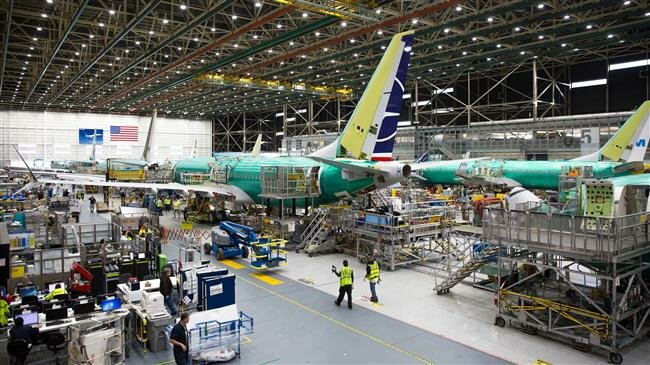A new software problem has been found in the troubled Boeing 737 Max that could push the plane’s nose down automatically, and fixing the flaw is almost certain to further delay the plane’s return to flying after two deadly crashes.
Boeing said Wednesday that the US Federal Aviation Administration (FAA) “identified an additional requirement” for software changes that the aircraft manufacturer has been working on for eight months, since shortly after the first crash.
“Boeing agrees with the FAA’s decision and request, and is working on the required software to address the FAA’s request,” Boeing said in a statement.
Government test pilots trying out Boeing’s updated Max software in a flight simulator last week found a flaw that could result in the plane’s nose pitching down, according to two people familiar with the matter.
In both Max crashes, the plane’s flight-control software pushed the nose down based on faulty readings from one sensor.
The people said fixing the issue might be accomplished through software changes or by replacing a microprocessor in the plane’s flight-control system. One said the latest setback is likely to delay the plane’s return to service by an extra one to three months. Both spoke on condition of anonymity to discuss aspects of the review process that are not public.
In a statement, the FAA said it will lift its grounding of the plane only when it deems the jet safe — there is no set timeline.
“On the most recent issue, the FAA’s process is designed to discover and highlight potential risks. The FAA recently found a potential risk that Boeing must mitigate,” the agency said.
The Max began passenger flights in 2017 and is Boeing’s best-selling plane, although fewer than 400 have been delivered to airlines.
A Max flown by Indonesia’s Lion Air crashed in October, and an Ethiopian Airlines Max crashed in March. In all, 346 people died. Days after the second crash, regulators around the world grounded the plane.
Boeing is scaling back the power of flight-control software called MCAS to push the nose down. It is also linking the software’s nose-down command to two sensors on each plane instead of relying on just one in the original design.
It is still uncertain what kind of training pilots will get for flying the plane with the new software — either computer-based or in-flight simulators.
Meanwhile, some airlines that own Max jets have had to cancel large numbers of flights while the planes remain grounded.
On Wednesday, United Airlines pushed back the scheduled return of its 14 Max jets until September. Southwest Airlines and American Airlines had already made similar announcements — an acknowledgement that the plane won’t return to flying as soon as the airlines had hoped.
(Source: AP)

